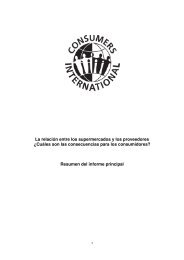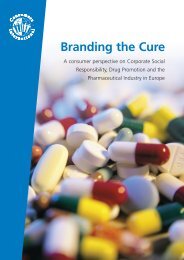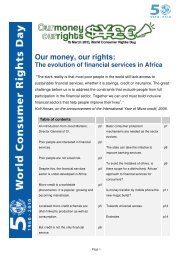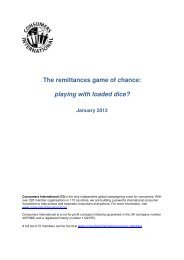Voices for Change: the Consumer Right to Representation
Voices for Change: the Consumer Right to Representation
Voices for Change: the Consumer Right to Representation
Create successful ePaper yourself
Turn your PDF publications into a flip-book with our unique Google optimized e-Paper software.
World <strong>Consumer</strong> <strong>Right</strong>s Day 2002: <strong>Voices</strong> <strong>for</strong> <strong>Change</strong><br />
have reduced <strong>the</strong> number of bodies” where<br />
representation could occur.<br />
Even where <strong>for</strong>mal representation is abundant,<br />
its impact is hamstrung by lack of resources –<br />
a limitation encountered in rich and poor<br />
countries alike. Even <strong>the</strong> august <strong>Consumer</strong>s<br />
Union (US) cites as a major obstacle <strong>to</strong><br />
representation work <strong>the</strong> “need <strong>for</strong> funding <strong>to</strong><br />
support staff travel and participation in <strong>the</strong><br />
policy-making arenas already open <strong>to</strong> us,<br />
or could be, if we had <strong>the</strong> resources <strong>to</strong><br />
push <strong>for</strong> it,” writes Carolyn Cairns.<br />
In Niger, <strong>for</strong> example, inclusion of <strong>the</strong><br />
Association de Défense des Droits des<br />
Consommateurs in <strong>the</strong> Ministry of<br />
Transportation’s National Committee was<br />
a step <strong>for</strong>ward. “Public transportation is<br />
one of <strong>the</strong> least endowed sec<strong>to</strong>rs in Niger,”<br />
writes Mahaman Nouri. “The au<strong>to</strong> fleet is<br />
dilapidated, regulations are obsolete,<br />
technical inspections are a mockery,<br />
inspec<strong>to</strong>rs are corrupt, public roads are in<br />
poor state of repair.” <strong>Consumer</strong>s are <strong>the</strong><br />
victims of frequent accidents and high tariffs.<br />
The National Transportation Committee<br />
includes Ministry officials, delegates from<br />
several transportation unions, carriers and<br />
related technical unions, in addition <strong>to</strong> representatives<br />
from two consumer organisations<br />
(ADDC and ORCONI). The committee is<br />
empowered <strong>to</strong> regulate a number of<br />
important transportation issues, and is<br />
entitled <strong>to</strong> drawn on resources provided by<br />
<strong>the</strong> Chamber of Commerce, Agriculture,<br />
Industry and Artisanship. “But no resources<br />
are available at this time,” adds Nouri.<br />
As noted in <strong>the</strong> quantitative analysis,<br />
strategies <strong>for</strong> exercising representation are as<br />
likely <strong>to</strong> be defined by <strong>the</strong> national context as<br />
by <strong>the</strong> specific issue. Illustrating this is <strong>the</strong><br />
following description from Senegal of <strong>the</strong><br />
realpolitick of lobbying, where good<br />
connections and back-scratching were<br />
required <strong>to</strong> carry <strong>the</strong> day. “At first, <strong>the</strong> skills<br />
we needed (<strong>to</strong> sit on <strong>the</strong> Water Regula<strong>to</strong>ry<br />
Commission) were technical,” writes Dr<br />
Ahmadou Abdoulaye Aidara of <strong>the</strong><br />
ADEETélS. “But subsequent steps demanded<br />
lobbying and defensive action within <strong>the</strong><br />
government, and this required playing on<br />
family relations, friendships and frank<br />
collaboration between conflicting interests.”<br />
Even so, representation strategies can backfire,<br />
as <strong>the</strong> Burundi <strong>Consumer</strong> Association<br />
discovered when its interventions be<strong>for</strong>e <strong>the</strong><br />
national Fuel Price Committee were “adversely<br />
exploited” by o<strong>the</strong>r commission members. Like<br />
o<strong>the</strong>r groups working in utilities, ABUCO cites<br />
timely provision of in<strong>for</strong>mation as a key need<br />
<strong>to</strong> improve its defence of consumers be<strong>for</strong>e<br />
regula<strong>to</strong>ry bodies.<br />
When representation cannot obtain soughtafter<br />
benefits, or when involvement poses <strong>the</strong><br />
danger – or <strong>the</strong> perception – of co-optation,<br />
defence of consumer welfare may demand a<br />
serious re-thinking of representation from<br />
within as a viable strategy. The case studies<br />
showed that consumer groups are zealous of<br />
<strong>the</strong>ir independence. For example, Brazil’s<br />
Institu<strong>to</strong> Brasileiro de Defesa do Consumidor<br />
(IDEC) lost <strong>the</strong> battle but won <strong>the</strong> war when it<br />
was thrown off an advisory committee on<br />
medicines <strong>for</strong> going public with its doubts<br />
about medicines that were eventually banned.<br />
Once avenues <strong>for</strong> representation have been<br />
exhausted, alternative strategies may be<br />
employed. Working with <strong>the</strong> media is often<br />
effective, as is lobbying and o<strong>the</strong>r <strong>for</strong>ms of<br />
advocacy that tend <strong>to</strong> operate from <strong>the</strong><br />
outside in. Not least among <strong>the</strong>se is legal<br />
action. “In our experience,” writes Dr Horacio<br />
Luis Bersten of Argentina’s Unión de Usuarios<br />
y Consumidores, “<strong>the</strong> best type of consumer<br />
representation is via class action suits that<br />
reverse situations it would impossible <strong>to</strong><br />
change any o<strong>the</strong>r way.” Case studies from<br />
consumer groups in India, Hong Kong,<br />
Macao, Argentina and many o<strong>the</strong>r nations<br />
seconded this view.<br />
33






![pkef]Qmf eg]sf] s] xf] < - Consumers International](https://img.yumpu.com/6479658/1/184x260/pkefqmf-egsf-s-xf-consumers-international.jpg?quality=85)
